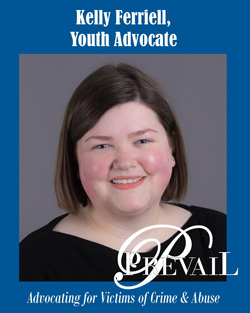By KELLY FERRIELL
Youth Advocate with Prevail
 In my work as a youth advocate, I often hear parents tell me, “I wish my teen would just put their foot down and say ‘no’.”
In my work as a youth advocate, I often hear parents tell me, “I wish my teen would just put their foot down and say ‘no’.”
Honestly, saying “no” is one of the most challenging responses to give to another person. Saying “no” requires boundaries, which are clear guidelines about what actions we feel are okay and not okay within a relationship. In most teen relationships, boundaries are either missing or are nonexistent.
Boundaries help us build trust in a relationship. If a dating partner understands and upholds our boundaries, it shows that they respect us. If they don’t care about or disregard boundaries we have put in place, this is an indication that this relationship is unhealthy. We can have boundaries regarding our bodies, our thoughts and emotions, our personal belongings and property, our sexual interactions, our time and space, our religious or spiritual beliefs or disbeliefs and how we want people to interact with us.
In order to support a child as they develop their own boundaries, it is important to teach about consent. Consent is a freely given, reversible, informed, enthusiastic and specific agreement to participate in an interaction with another person.
Development of boundaries starts when children are very young and are able to begin making their own choices. We can teach consent to young children by giving them options about how they want to greet family members and friends. Instead of telling our children to give someone a hug or kiss, we can provide options. For example, “Would you like to give grandma a hug, high five or handshake?” or “Can I give you a kiss on the cheek?” are effective ways to help children outline their options and support the choice that makes them feel the most comfortable. Building this foundation is vital to the development of autonomy.
Autonomy refers to a sense of self that includes personal responsibility. Autonomy is what allows children the ability to set and maintain boundaries with others, make choices that align with their individual values and beliefs, and prioritize personal safety. We can build autonomy by including teens in conversations about their bodies and health, gaining their feedback about goals and needs and addressing concerns in an honest yet compassionate way.
Healthy relationships require boundaries, consent and autonomy. By providing opportunities for children to practice making choices and supporting their decisions, we are allowing them to develop the skills needed to build safe connections with others.
I ask you to join Prevail in recognition of Teen Dating Violence Awareness Month (TDVAM). This February, look for our TDVAM toolkit (available on Prevail’s website at this link), social media posts and follow-ups to this article. Each of us has the opportunity to encourage and empower teens to create healthy connections with others. Please consider how you can support Prevail’s mission of eliminating violence from our community by promoting healthy relationships.
Keep reading next week with information about modeling healthy relationships and tips to make conversations with teens the most effective.
